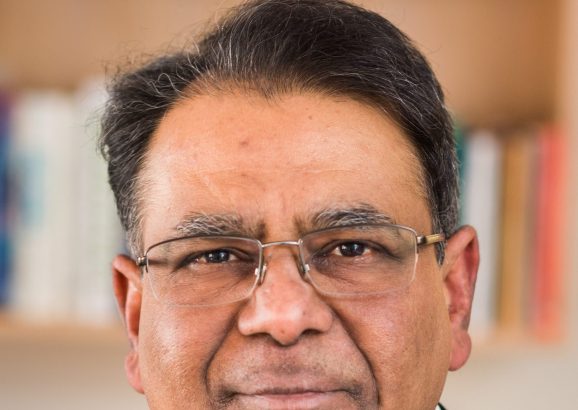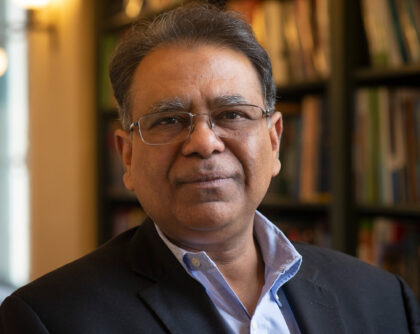Arup K. Chakraborty
Professor of Chemical Engineering, Physics, and Chemistry
Research Interests
Statistical Mechanics, Molecular and Cellular Immunology, Immune response to HIV, Vaccine development, Gene regulation in mammals.
Biographic Sketch
Arup K. Chakraborty is one of the 12 Institute Professors at MIT, the highest rank awarded to a MIT faculty member, and holds the John M. Deutch Institute Professorship. He is also a Professor of Chemical Engineering, Physics, and Chemistry at MIT. He served as the founding Director of MIT’s Institute for Medical Engineering and Science, and he is a founding member of the Ragon Institute of MIT, MGH, and Harvard. For over two decades now, Chakraborty’s work has largely focused on bringing together approaches from statistical physics, immunology, and virology. His interests span T cell signaling, development of the T cell repertoire, and a mechanistic understanding of virus evolution, antibody responses, and vaccine design. Since 2016, Chakraborty has also been interested in the role of phase separation in gene regulation. Chakraborty is one of only 26 individuals who are members of all three branches of the US National Academies – National Academy of Sciences, National Academy of Medicine, and National Academy of Engineering. He is also a Fellow of the American Academy of Arts & Sciences, and has received many other honors including the NIH Director’s Pioneer Award, the E. O. Lawrence Medal (DOE), a Guggenheim Fellowship, the Max Delbruck Prize in Biological Physics from the American Physical Society, the Colburn, Professional Progress, and Prausnitz Institute Lectureship from the AIChE, and three honorary doctorates. Chakraborty has received 7 awards for his classroom teaching and he is a co-author of the book “Viruses, Pandemics, & Immunity”. Chakraborty is a member of the Board of Governors of the Wellcome Trust, and serves as a consultant for biotechnology companies.

Arup Chakraborty named Institute Professor
Among two chemical engineers awarded MIT’s highest faculty honor.
Awards & Honors
- 2023 // Miegunyah Distinguished Visiting Fellow, University of Melbourne and Peter Doherty Institute
- 2023 // James Swan Outstanding Graduate Faculty Award, Chemical Engineering Department, MIT
- 2023 // Gubbins Lecture, North Carolina State University
- 2023 // Max Delbrück Prize in Biological Physics (APS) "for the leading role in initiating the field of computational immunology, aimed at applying approaches from physical sciences and engineering to unravel the mechanistic underpinnings of the adaptive immune response to pathogens, and to harness this understanding to help design vaccines and therapy."
- 2021 // Named Institute Professor (MIT)
- 2021 // Outstanding Graduate Teaching Award, Chemical Engineering Department, MIT
- 2021 // John M. Prausnitz Institute Lecturer, American Institute of Chemical Engineers
- 2020 // Schiesser Distinguished Lecture, Lehigh University
- 2020 // Outstanding Graduate Teaching award, Chemical Engineering department, MIT
- 2019 // Doctor of Engineering honoris causa, Hong Kong University of Science & Technology
- 2018 // John Simon Guggenheim Fellowship
- 2018 // Moore Distinguished Scholar, Caltech
- 2017 // Elected, Member of the National Academy of Medicine
- 2016 // Elected, Member of the National Academy of Sciences
- 2012 // Outstanding Graduate Teaching award, Chemical Engineering department, MIT
- 2009 // Outstanding Graduate Teaching award, Chemical Engineering department, MIT
- 2008 // Elected Fellow, American Association for the Advancement of Science
- 2008 // Distinguished Alumnus Award, Indian Institute of Technology-Kanpur
- 2007 // Elected, Fellow of the American Academy of Arts and Sciences
- 2007 // E.O. Lawrence Award for Life Sciences, DOE
- 2006-11 // NIH Director’s Pioneer Award
- 2005 // Presidential Citation for Outstanding Achievement, Univ. of Delaware
- 2005 // Dept. of Chem. Eng. Teaching Award, UC Berkeley
- 2005 // Engineering Foundation Endowed Lectureship, U.T. Austin
- 2004 // Elected, Member of the National Academy of Engineering
- 2004 // Professional Progress Award, American Institute of Chemical Engineers
- 1999-00 // Research Prof., Miller Inst. for Basic Science, Berkeley
- 1996 // Allan P. Colburn Award, American Institute of Chemical Engineers
- 1996-97 // AIChE, Berkeley Student Chapter, Appreciation for Distinguished Teaching
- 1994 // Camille Dreyfus Teacher-Scholar Award
- 1993-98 // Royal Academy of Engineering (U.K.), ICI Fellowship
- 1992-97 // National Young Investigator Award
- 1989-92 // Shell Young Faculty Fellow
Key Publications
-
Lee et al, Science (2003)
-
Das et al., Cell (2009)
-
Kosmrlj et al, Nature (2010)
